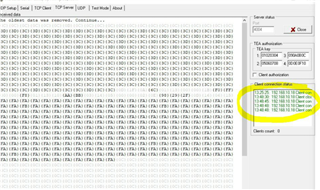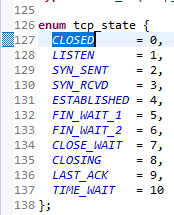Hello All,
I want to send 792 byte data from my client gateway to the server over ethernet. Now I am able to send all data over ethernet but everytime I open new connection. you can see the conenction inside yellow circle. But I want to send all data over ethernet without opening new connection. I mean ı want only one connection in the yellow circle.
you can see the code below.
How can I configure this code to do for one connection? please let me know if you have an idea.

void ETH_Connection_Proccess(void)
{
if(Gateway.ETHERNET_Mode == 0)
{
usb_printf("\n",1);
usb_printf("ETH NOT ENABLED CAN'T POST MESSAGE\n", 35);
Gateway.Priority = Gateway.ETHERNET_Priority + 1;
}
else if(ETH_Ctrl.eth_connection_status == 0)
{
usb_printf("\n",1);
usb_printf("ETH NOT CONNECTED CAN'T POST MESSAGE\n", 37);
Gateway.Priority = Gateway.ETHERNET_Priority + 1;
}
else if(ETH_Ctrl.eth_connection_status == 1 && Gateway.ETHERNET_Mode == 1)
{
ETH_Ctrl.connectTYPE = ETHERNET_POST;
//
// Connect to host address
//
tcp_echoclient_connect(Gateway.Host_Address,Gateway.Remote_Port_Number);
ETH_Ctrl.status = ETH_POST_CONNECT_SENT;
ETH_Ctrl.timeout = 1;
}
}
/**
* @brief Connects to the TCP echo server
* @param None
* @retval None
*/
void tcp_echoclient_connect(char* IP_ARR,char* PORT_NUM)
{
ip_addr_t DestIPaddr;
uint16_t DestPORTAddr;
/* create new tcp pcb */
echoclient_pcb = tcp_new();
if (echoclient_pcb != NULL)
{
ipaddr_aton((const char *)IP_ARR,&DestIPaddr);
DestPORTAddr = atoi(PORT_NUM);
/* connect to destination address/port */
tcp_connect(echoclient_pcb,&DestIPaddr,DestPORTAddr,tcp_echoclient_connected);
}
}
/**
* @brief Function called when TCP connection established
* @param tpcb: pointer on the connection contol block
* @param err: when connection correctly established err should be ERR_OK
* @retval err_t: returned error
*/
static err_t tcp_echoclient_connected(void *arg, struct tcp_pcb *tpcb, err_t err)
{
struct echoclient *es = NULL;
// uint16_t index2;
uint16_t data_lenght;
data_lenght=792;
if (err == ERR_OK)
{
/* allocate structure es to maintain tcp connection informations */
es = (struct echoclient *)mem_malloc(sizeof(struct echoclient));
if (es != NULL)
{
es->state = ES_CONNECTED;
es->pcb = tpcb;
if(ETH_Ctrl.connectTYPE == ETHERNET_POST)
{
// sprintf((char*)data,"%sContent-Length: %d\r\n\r\n%s\r\n",Gateway.POST_message_constant_part,Gateway.tcp_message_length,Gateway.tcp_message);
memcpy(data,Gateway.tcp_message,Gateway.tcp_message_length); //1024 tcp message datanın ilk 792 adet datası databuffer içine kaydedilir
/* allocate pbuf */
es->p_tx = pbuf_alloc(PBUF_TRANSPORT, sizeof(data) , PBUF_POOL); //burası gönderilen buffer ile aynı ozellikte bos bir buffer yaratıyor
if (es->p_tx)
{
/* copy data to pbuf */
// pbuf_take(es->p_tx, (char*)data, strlen((char*)data));
pbuf_take(es->p_tx, (char*)data, data_lenght); //792 byte burada yukarıda yeni tanımlananan buffera, data bufferını kopyalıyoruz
/* pass newly allocated es structure as argument to tpcb */
tcp_arg(tpcb, es);
/* initialize LwIP tcp_recv callback function */
tcp_recv(tpcb, tcp_echoclient_recv);
/* initialize LwIP tcp_sent callback function */
tcp_sent(tpcb, tcp_echoclient_sent);
/* initialize LwIP tcp_poll callback function */
tcp_poll(tpcb, tcp_echoclient_poll, 1);
/* send data */
tcp_echoclient_send(tpcb,es);
return ERR_OK;
}
}
}
else
{
/* close connection */
tcp_echoclient_connection_close(tpcb, es);
/* return memory allocation error */
return ERR_MEM;
}
}
else
{
/* close connection */
tcp_echoclient_connection_close(tpcb, es);
}
return err;
}
thank you
BR,
Bekir


